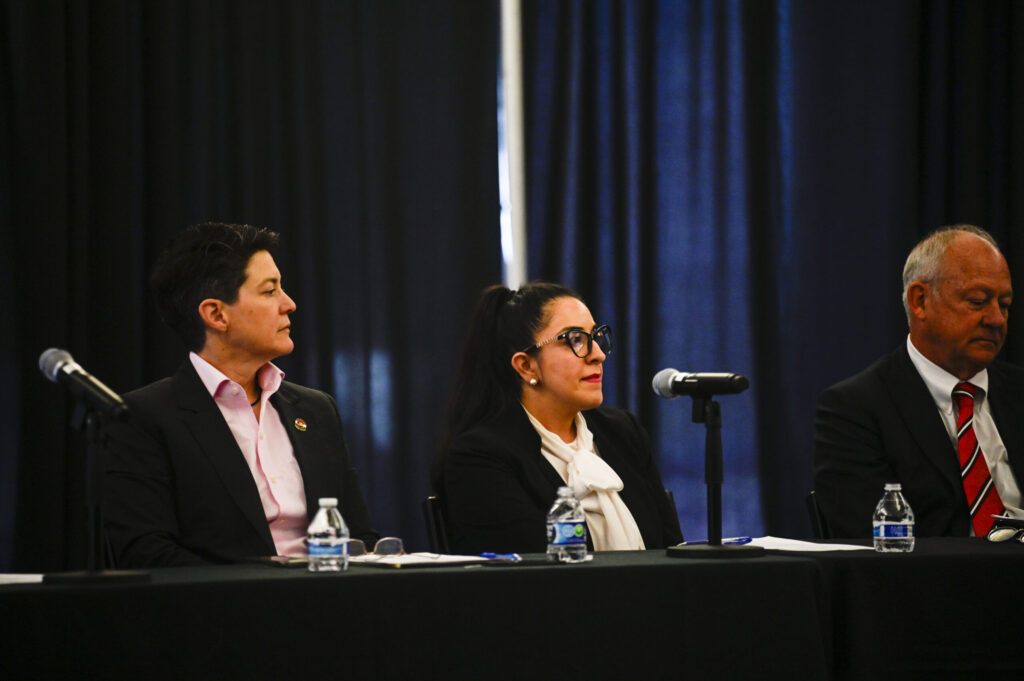Colorado justices ponder whether defendants must repay money police use for drug buys
If undercover police officers buy drugs from a suspected drug dealer, but they let him leave with the money and never recover it, is the defendant obligated to repay the amount as crime victim restitution?
Members of the Colorado Supreme Court grappled with the question on Thursday, with multiple justices wondering how the state’s restitution law envisioned the repayment of “buy money” in the first place.
“The question is whether the government in this case is a victim. Why is the government a victim of this drug crime?” asked Justice Richard L. Gabriel during oral arguments.
“I’m having a hard time with the ‘victim’ label as well when law enforcement chose buy money to try to investigate this. They didn’t have to,” said Justice Carlos A. Samour Jr. to the government’s attorney. “This is budgeted for and they chose to do it that way. And now that they lose the money, you’re asking us to find they’re a victim because they suffered a pecuniary loss. That doesn’t seem like a fit to me.”
However, Justice Brian D. Boatright suggested the buy money might count as “money advanced by law enforcement agencies,” which state law includes in its definition of crime victim restitution.
“The legislature must have intended something when they said ‘advance,'” he said.
Nathan Hollis pleaded guilty to two drug distribution charges in which he sold narcotics on multiple occasions to an undercover officer in Weld County. Law enforcement waited for months after the first transaction to arrest Hollis, at which point $1,640 he received from the officer was gone.
Prosecutors sought to have Hollis repay the $1,640 in buy money as financial restitution. Hollis objected, noting Colorado’s restitution law for crime victims covers money advanced by law enforcement agencies and “extraordinary” investigation costs. To Hollis, the buy money fell into neither of those categories.
The Court of Appeals agreed with him.
The drug task force investigating Hollis was “not a victim under the restitution statute,” wrote Judge Ted C. Tow III in the three-judge panel’s opinion. Moreover, the buy money was “used solely to investigate drug-related crimes. And as officers of the Task Force testified, controlled buys occur several times per month using money specifically budgeted for that purpose.”
The Colorado Attorney General’s Office appealed to the Supreme Court, noting it had never squarely addressed whether law enforcement agencies could recover buy money as a form of restitution.
“When a criminal defendant has gotten money from an illegal drug transaction, he shouldn’t benefit from his wrongdoing. He should have to give that money back,” argued Assistant Attorney General Marixa Frias to the court.
Chief Justice Monica M. Márquez observed the buy money was not exactly the police’s “loss,” but was offered in exchange for drugs in a voluntary transaction.
“It’s harder in this context to portray the government as a victim,” she said.
“It’s an illegal transaction,” responded Frias. “The agency is a victim here because they’re out of that money.”
“It’s an illegal transaction, but it’s still a transaction,” said Márquez.
Justice Melissa Hart suggested money “advanced” by law enforcement could include helping a sexual assault victim with new clothing or a home invasion victim with a new lock.
“Why wouldn’t that be what the legislature was thinking of, rather than money advanced by law enforcement but unconnected to a victim?” she asked.
Public defender Lisa Weisz urged the court not to find the buy money was something advanced by law enforcement, arguing an “advance” occurs when the entity paying the money is not getting anything in return.
“Would it qualify if a police officer undercover ‘advanced’ money to a prostitute?” asked Boatright.
“It depends if they got something back,” responded Weisz.
“There’s gonna be a problem if he did,” said Boatright to chuckles.
Some justices also felt, as the Court of Appeals did, that the use of buy money was not an extraordinary investigation cost.
“A lot of police investigations and stings use buy money,” said Gabriel.
“And what to make of the fact that there was an existing budget for this when thinking of this as extraordinary?” added Justice Maria E. Berkenkotter.
Weisz agreed the key factor was how commonly police pay criminals for drugs, information or other purposes.
“I would guess right now in Colorado Springs there are 20 officers doing drug-buy busts,” she said. “It seems exceedingly common to me. Especially in federal court, the use of paid informants is bread and butter.”
Frias countered that the use of buy money was uncommon, considering the totality of law enforcement’s activities.
“It’s not their mission to fund criminal activity. It’s not their mission to participate in illegal drug transactions,” she said.
Arguments took place at Falcon High School in El Paso County as part of the judiciary’s “Courts in the Community” programming.
The case is People v. Hollis.
Colorado Politics Must-Reads:














